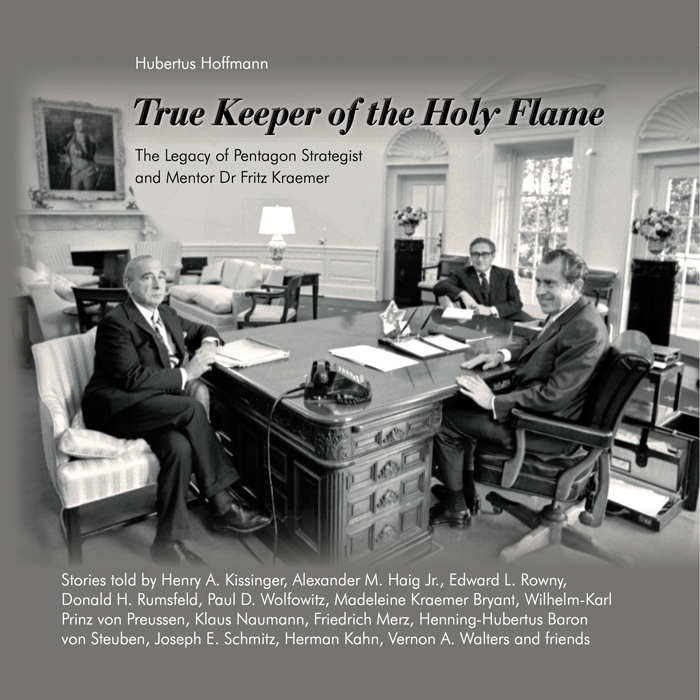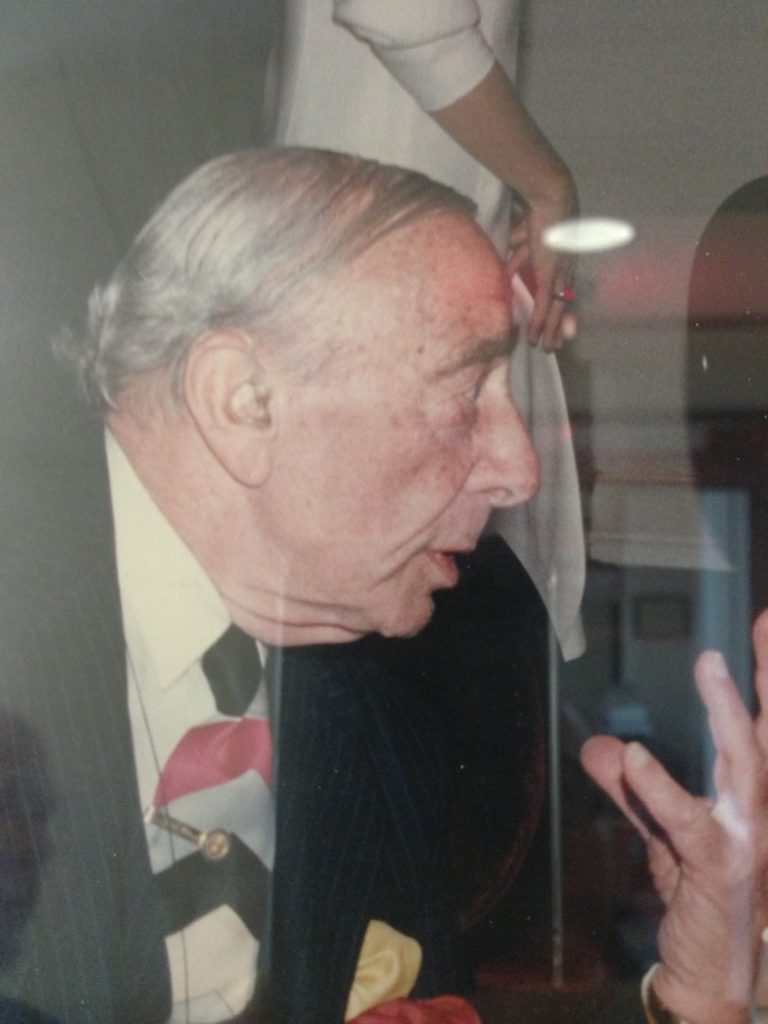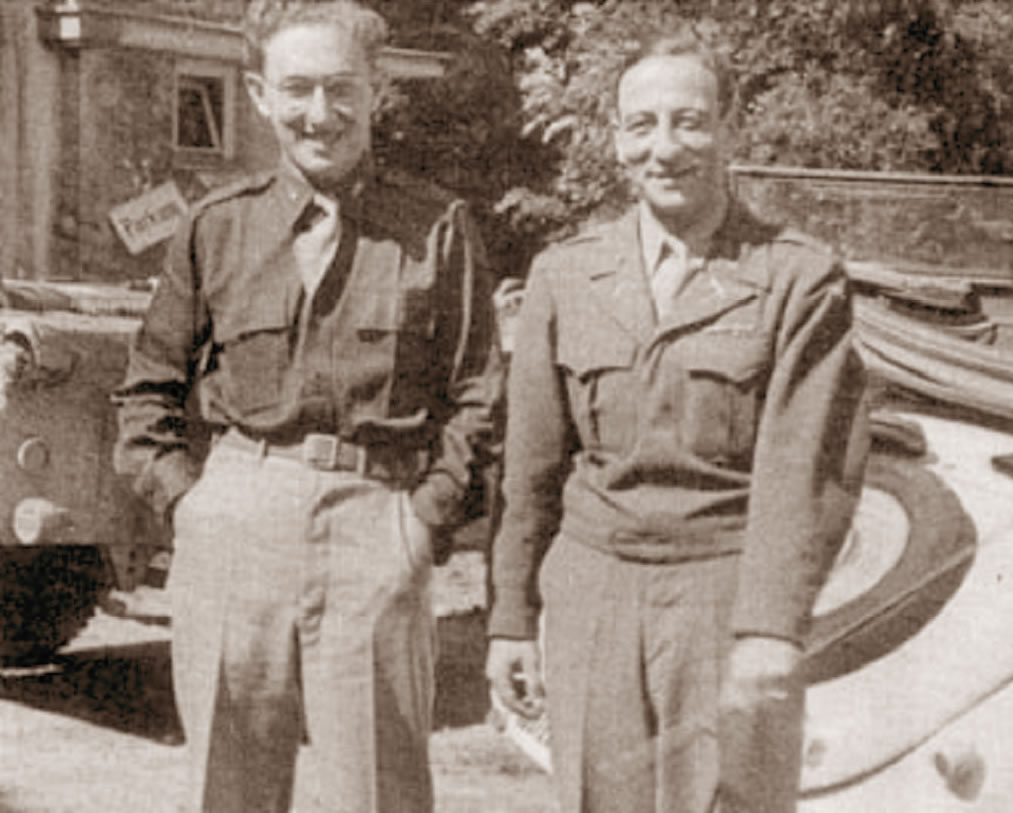Pentagon guru and geopolitical genius Dr. Fritz Kraemer was buried in Arlington in September 2003 with full military honors, as other heros of the United States of America.
- In 1993 he wrote this essay On Elitism: Look for Men and Women of Excellence! for his former boss, U.S. Secretary of Defense James Schlesinger. It is published in the biography of his mentee, GLOBALO founder Dr Hubertus Hoffmann (True Keeper of the Holy Flame. The Legacy of Pentagon Strategist and Mentor Dr Fritz Kraemer, page 104ff).
- Fritz Kraemer (1908-2003), who emigrated from Germany in 1939, discovered and became the iron mentor of young Henry Kissinger and Alexander Haig for many years. As geopolitical advisor in the Pentagon he influenced many leaders to avoid ‘provocative weakness’ and defend freedom. He was the real ‘Dr Strangelove’, the man behind closed doors.

- During this time of Trumpmania in the United States of America and with him in the White House as the leader of the American and the Free World, it is good to read how this great geopolitical thinker analyzed democracy and the need for excellence in America and the qualities an American leaders must have.

Dr Fritz Kraemer predicted the rise of a ‘demagogue and false prophets’ – like Donald Trump- already 23 years ago:
“We are facing a very real growing danger that the American people will get so bored, or apathetic, or cynical and disgusted with the artificiality and hollowness of “politics” that they will simply refuse to participate! In our 1992 national election only 37.3% of the eligible voters actually took the trouble of going to the polls, which means that almost 2/3 of the electorate did not find it worth their while to cast a ballot. If the normal, “legitimate” but dehydrated, politicians can no longer move or attract people, they are leaving a void, an ever more yawning gap which will be filled, inevitably, by demagogues speaking fiery words with shining eyes; and the masses – feeling empty, unled and disoriented – will turn to the false prophets with their seemingly inspired and therefore rather inspiring messages.”

Kraemer was an elitist, who believed that we need to have to look for qualified elite people to lead democracies, not populist like Donald Trump.
He demanded:
“We should always at least look for men and women of excellence when choosing people for key functions in the political, economic, academic, or even religious spheres.”
“In the purely political field, especially in the selection and election of candidates, there is an additional problem for the voting public. The speeches and other utterances of candidates are ghost-written and carefully concocted, the real personalities are hidden behind a veil of pure imagery; there is little visible spontaneity and much staging. Reviewing the current Democratic and Republican presidential candidates, for example, I would not dare to say, with any degree of certainty, what and who these men really are and what convictions, if any, they hold in their heart of hearts.”
Read his ideas here:
On Elitism: Look for Men and Women of Excellence !
By Dr Fritz Kraemer
I am calling for an elite on which we can draw, even in a democratic society, to fill important positions not only in government, but also in business, education, and many other fields. Changing my terminology, but not my meaning, I might simply say that, however democratic we might happen to be, we should always at least look for men and women of excellence when choosing people for key functions in the political, economic, academic, or even religious spheres.
While in our modern age – in the U.S. as well as in Europe – the word elite is suspect, everybody is calling for “excellence.” But only lip service is being paid to this lofty concept. “Excellence” in Latin means to stand out, but we do not really look for genuinely outstanding people who are “taller” than the average. There is, on the contrary, a desire for sameness, for comfortable mediocrity, for conformity, which is inherently intolerant of any kind of superiority. This alone is a great obstacle to the selection of the non-mediocre.
Below Dr Fritz Kraemer with his pupil Henry Kissinger briefing US President Richard Nixon in the Oval Office in 1973. Picture of the biography by GLOBALO Founder Dr Hubertus Hoffmann about his long-time mentor, the “True Keeper of the Holy Flame”.
Something else, however, is – in practice – even more important: those who have to pick others and who, by chance, are sincerely trying to find the best, the most “excellent,” do not know any longer what criteria to apply in their search. In an age of facts and figures – in which, moreover, ethical values are no longer considered absolute but merely relative – men find it difficult to base their judgment regarding candidates for office, or for jobs, on intangible, non-quantifiable personality traits such as strength of character, fortitude, conscientiousness.
Not in theory, perhaps, but certainly in practice, modern society looks at labels and paper credentials rather than at substance. In the Civil Service, for example, it has become a custom to admit only Ph.D.s to the more important positions, although individuals who never had the time or money to acquire such a degree may actually be infinitely better qualified. Due to the vicissitudes of my life, I obtained two doctorates, and this “academic record” has unduly facilitated my government career. In reality, of course, they do not show at all who I am and who I am not; they are not even a sign of intellectual prowess, because they might well have been bestowed by a mediocre faculty on an equally mediocre student. A double Ph.D. may mean little more, in fact, than a nicely patented nobody.
We also accept a former Ambassador to Bangkok or Moscow as a prestigious authority on Thailand or the Russia, even if his ever repeated anecdotes and stories of “personal experiences” reveal him as irretrievably superficial. And a professor of Political Science from Harvard, Princeton, Yale, etc., will be quoted as a certified expert almost regardless of the true quality of his writings and teachings. Thus, looking for excellence has degenerated into asking for individuals with easily discernible license plates.
In the purely political field, especially in the selection and election of candidates, there is an additional problem for the voting public. The speeches and other utterances of candidates are ghost-written and carefully concocted, the real personalities are hidden behind a veil of pure imagery; there is little visible spontaneity and much staging. Reviewing the current Democratic and Republican presidential candidates, for example, I would not dare to say, with any degree of certainty, what and who these men really are and what convictions, if any, they hold in their heart of hearts; although – in contrast to the general public, which cannot remember even the recent past.
We are facing a very real growing danger that the American people will get so bored, or apathetic, or cynical and disgusted with the artificiality and hollowness of “politics” that they will simply refuse to participate! In our 1992 national election only 37.3% of the eligible voters actually took the trouble of going to the polls, which means that almost 2/3 of the electorate did not find it worth their while to cast a ballot. If the normal, “legitimate” but dehydrated, politicians can no longer move or attract people, they are leaving a void, an ever more yawning gap which will be filled, inevitably, by demagogues speaking fiery words with shining eyes; and the masses – feeling empty, unled and disoriented – will turn to the false prophets with their seemingly inspired and therefore rather inspiring messages.
My fear regarding the inner corrosion of the very “successful” politician (President, Senator, Representative, Governor, etc.) is not, by the way, that during a long career of compromising and sailing with the wind he will lose his aggressiveness, cleverness or even the capability to command, but that – to quote a formula I have used for many year now – he will leave part of his soul on every rung of the ladder leading him to the top. The harsh school of the upward struggle may, in fact, have made him a master tactician but the Holy Fire, the inner passion, the vision has gone, had to go, in a world of make-believe and ghost writers, of continuous accommodation to public opinion polls, of dependence on such non-events as “caucuses” in Iowa in which only a tiny fraction of the voters take part anyway. It seems revealing to me that the word “emotional” has assumed a pejorative meaning, as if deep convictions could actually be held in some nicely abstract, coolly detached fashion, “untainted” by very strong feelings of the individual holding such convictions.
My ultimate reason, however, for postulating the necessity of an elite is the observation that in control everyday reality the ideal of an egalitarian society has quite simply led to a loss of quality. Since, for example, virtually everyone now is going to high school, the demands made on college education has become a mass enterprise, very many can obtain an academic degree today who formerly would have had to be satisfied with a high school certificate. I do admit that the “classical” high school curriculum of my youth – nine years of Latin (every day of the six-day week) and six years of Greek (every day of the six-day week), plus one modern foreign language in addition to mathematics, physics, chemistry, geography and history – is no longer feasible, although it did accustom me and my classmates to become acquainted, very early in life, with subjects (Greek, Latin) of no visible “practical” value which, however, broadened my vision greatly and opened windows to distant landscapes.
Yet, even today, one could certainly demand that a high school student taking Spanish or French as his one foreign language has to learn the grammar of that language, instead of acquiring merely a basic and primitive vocabulary. One could likewise demand of a college graduate in Political Science a knowledge of world history in general outlines and an awareness of internal developments of a few key countries in some depth, and such a graduate should also be expected to have a very precise idea of where on the map Indonesia, Nigeria, Honduras, or Bolivia are located. As regards professional diplomats, would it be unjust to ask that henceforth they must be well grounded in international law and demonstrate familiarity with global political and economic trends? One might even insist that a professor of Comparative Government be well acquainted with the actual constitutions of perhaps a dozen important nations and that a priest or pastor have some knowledge of Hebrew and Greek enabling him to look, an occasion, at the original text of the Bible. In other words, one could, without becoming undemocratic, raise the level of requirements for students as well as for teachers and professors, etc., and thus eliminate the very large and clogging numbers of those who are “making it” through the educational system only because that system is geared to mass production rather than to the development of any personal excellence, to some specialties rather than to the acquisition of a broader understanding of even their own general field of endeavor.

Personally, I do not consider a formal education a necessary pre-condition for genuine achievement. Eric Hoffer, a bona fide dockyard worker until his 65th year who never went to college, had a far deeper grasp of historico-political reality than most learned professors. His book, “The True Believer,” shows an extraordinary breadth of knowledge and a depth of insight into history, past and current, which I for one can only admire and envy. Hoffer’s dictum: “Where the yearning for freedom destroys order, the yearning for order will destroy freedom,” is a splendid, pithy formulation of a basic truth that very few of the learned ones could have produced. If I suggest a more demanding educational system aiming at “excellence” rather than mass delivery of graduates to society, it is only because I am aware of the fact that our society simply will not talentscout for the untutored genius who cannot present some paper credentials, some formal card of admission. All I can realistically propose, therefore, is to make that plastic card more substantial and more intrinsically meaningful.
(I have fewer misgivings concerning our excellence in the natural, i.e., exact sciences [mathematics, atomic physics, electronics, etc.] than in the field of political and social “sciences” which are by no means exact and where superficiality, lack of knowledge, even fakery cannot so easily be found out and shown up. A political columnist, a political candidate or office-holder, a professor of political science may have a long record of wrong predictions and of faulty analyses and of eloquent but ill informed views, especially an foreign affairs, and he may very well survive as a respected oracle. An engineer on the other hand, whose design for a bridge is faulty, a mathematician or physicist whose equations do not equate will soon lose prestige and professional standing.)
That there is an objective contradiction between “excellence” and mass education is either not understood or, for ideological reasons, not admitted. The facts, however, are very clear. I once asked a young professor Kissinger (Political Science): “How many especially gifted students have you discovered this year?” His answer: “There are about 500 students in the class I teach and 120 in the Seminar I conduct; it is impossible to seek out individuals.” It is, indeed, an “impossible” situation since one cannot effectively guide, help, assist, encourage whole assemblages of people to achieve superior qualities of mind and character; one has to pay attention to individuals.
Lt 84th U.S. Army Dr Fritz Kraemer with his master-pupil sergeant Henry Kissinger (left) back in their Heimat in Germany in 1945.

Pay attention to individuals?
Modern educators, whatever they may loudly proclaim, method of instruction you can make virtually any “normal” group of students quite proficient in practically any subject. I remember a spirited discussion with faculty members of a renowned institute of higher learning where the professors heatedly bore down on a chance remark of mine that my own “gifts” were strictly limited to the so-called humanities, while from high school days on I had proven strikingly inept in natural sciences. They insisted that “everybody,” myself included, could do very well indeed in mathematics, physics, etc., if taught in the proper fashion. This professional belief assumes implicitly that, in the ultimate analysis, people are not too different in their natural giftedness and that it is all lastly a question of presenting a subject to them in a paedagogically “correct” manner. This is absurd. A young Italian peasant with a splendid natural voice who cannot even read music may be trained at a conservatory and, finally, become a leading opera singer; but ten years or more at that same conservatory will not make a singer of him who did not have such natural (if untrained) voice in the first place. Similarly, you can teach historical facts but you cannot teach a sense of history to those who do not possess a natural inner musicality for history. Nor can you teach psychological understanding of people and peoples to those not endowed with vibrating antennae for intangibles and imponderables that are outside and beyond the facts and figures zone.
An individual with an innate potential for excellence in foreign or military affairs may be totally ungifted in business. A business genius, on the other hand, may have no inner affinity whatever for the peculiar realities prevailing in international relations and in matters of national Defense. To recognize that talents are very unjustly distributed among human beings (and that the natural aptitudes of individuals differ from person to person) is, perhaps, anti-egalitarian, but it is certainly realistic.
How can young men and women even strive for excellence – be it only within the parameters of their own special giftedness – if the huge and soulless education-manufacturing plants make the students feel that all that is expected of them is an effort to obtain credit points, work more or less diligently for an upcoming test and, finally, get some degree (preferably from a big-name institution). In fact, in such an atmosphere an originally independent and highly endowed personality will be discouraged rather than permitted to develop in depth, because profundity and higher ethical aspirations would simply not fit the purpose of that costly education: to achieve visible, practical results.
(I have not yet read a recent book by Allan Bloom, professor of political philosophy at the University of Chicago, “The Closing of the American Mind,” subtitle, “How Higher Education has Failed Democracy and Impoverished the Souls of Today’s Students,” but the “impoverishment of the soul” part does sound quite remarkable coming from a man who has actually observed the system from within for decades.)
It is entirely possible that no preaching on my part, or on the part of anybody else, will change the existing educational situation and that high schools and colleges will continue to be swamped and smothered by having to serve too many.
Yet, there are two things each of us can do in his own circle of family and friends.

FIRST. We can teach our own children that “success” as such is by no means a hallmark of excellence and that they do not have to prove their worth by collecting high grades and impressive degrees at college or by climbing to prestigious positions later in life. When my son went off to college, I warned him that he might get straight “As” simply by writing papers cleverly reflecting a professor’s pet views, while he might get “Cs” (and less) as a result of expressing original and well-conceived but “unpopular” ideas. I assured him that he would never have to bend and bow, and sacrifice his convictions and his soul out of a feeling that his father would expect him to “show something,” i.e., a fine-looking paper record, for money spent on the son’s education. “If your academic record is far less than splendid, even if you fail,” I told him, “you will always be received by your father with pride and approval, provided you can answer ‘Yes’ to two questions: ‘Did you work hard? Did you stand up for your convictions?’ “ I have reasons to believe that it would be most helpful, especially to the more promising of the younger generation, if their parents (grandparents, uncles, etc.) would let them start out in the world with no doubt whatever that character and self-discipline, rather than showy “report cards,” are expected of them.
SECOND. We can teach our children that, while everyone has to earn a living, material riches are a rather minor reward to strive for. According to a person’s value system moral obligation, nevertheless, to be successful financially, just to show to themselves and to the world that they are no laggards.
With high income becoming a measuring rod of a person’s worth and social prestige, why should anyone voluntarily choose such materialistically unrewarding careers as civil or military service to the nation?
What normal, prudent father in this day and age would actually advise a son or daughter to dedicate his or her life to a cause rather than to the eminently practical and sensible goal of receiving maximum pay and very tangible remuneration for decades of work? How can we dare to direct those gifted and promising youngsters toward professions and occupations which clearly demand very considerable personal sacrifices for but modest rewards? What answer does one give to the brilliant man or woman who wants to get out of the military or of an important position in government so as to provide (at last!) better for himself and his long suffering family by making “some real money” in business? How, in other words, can one recruit not recommending this adage for public preaching but that I am referring to it as something we should teach our children within the family. And this is the meaning of the noblesse oblige shorthand message!
Any average person may, indeed, think primarily of himself and his clan but human beings are differently endowed by God (or by chance) and if you, my son or daughter happen to be particularly well endowed, if you truly belong to the excellent ones, then you do have a special obligation – nay, a mission – to bear heavier burdens and make greater sacrifices for a cause, e.g., good government, than the common herd.
I recognize, of course, the arrogance involved in such an elitist approach. Yet, it is an arrogance which does not demand privileges and rights for the elite, but imposes on it abnegation and duties.
My quarrel with egalitarianism is not that it denies special privileges to all and sundry, but that it does not admit the existence of special duties for SOME.




